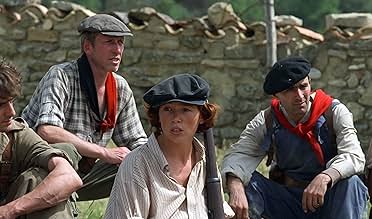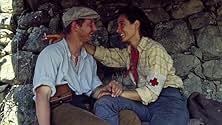David es un comunista desempleado que llega a España en 1937 durante la guerra civil para unirse a los republicanos y defender la democracia contra los fascistas. Se hace amigo de los soldad... Leer todoDavid es un comunista desempleado que llega a España en 1937 durante la guerra civil para unirse a los republicanos y defender la democracia contra los fascistas. Se hace amigo de los soldados.David es un comunista desempleado que llega a España en 1937 durante la guerra civil para unirse a los republicanos y defender la democracia contra los fascistas. Se hace amigo de los soldados.
- Dirección
- Guionista
- Elenco
- Nominada a1 premio BAFTA
- 8 premios ganados y 5 nominaciones en total
- Maite
- (as Iciar Bollain)
- Juan Vidal
- (as Marc Martinez)
- Bernard Goujon
- (as Frederic Pierrot)
- Militia member
- (as Andres Aladren)
- Militia member
- (as Roca)
- Militia member
- (as Emili Samper)
- Dirección
- Guionista
- Todo el elenco y el equipo
- Producción, taquilla y más en IMDbPro
Opiniones destacadas
It's a wonderful, intense, realistic and insightful look at the Spanish Civil War with the highly naturalistic cinematography and committed performances characteristic of Loach.
The reviews and debate concentrate on the action in Spain, which, for me, is only half the story that Loach is telling. I grew up in Liverpool in the 50's and 60's and knew quite a few David Carrs. Men then in their own fifties and sixties, often alone, keeping themselves to themselves in quiet corners of pubs and working men's clubs. They never told their own stories, never wanted credit, never wanted to relive their experiences in the Battle of the Atlantic, on the Baltic convoys, in North Africa. Someone who knew them would sometimes say "he was torpedoed four times" or "he was two years in Spain fighting Franco" and that would be that.
So I am delighted that David Carr, played by the incomparable Ian Hart, and this movie is such a fabulous testament to all of them. I love the way his life expands onto the screen, from the small remainder in a Liverpool council flat, from the letters uncovered by his death, into the light and air of Spain, enabling us to share in his buried idealism, its betrayal, then to witness the love of his life and the loss of it. Incredibly beautiful and truly heartbreaking. Unsuspected by all but his best mates and his newly enlightened granddaughter, David is surely off to Valhalla to be reunited with Blanca and his warrior friends of the past. I cannot think of anything in film so unsentimental yet so poignantly moving as her last salute.
This isn't Don Quixote, though. Nor is it Orwell, who is magnificent in an entirely different way, nor is it Hemingway's brash heroism or Saving Private Ryan's gung-ho bullet-for-bullet style of "historical verisimilitude".
It doesn't matter at all whether the events are being portrayed with strict accuracy or not. This is the authentic texture of twentieth century history in perfect context, portrayed through the lens of one man's experience.
And there is hardly anything else like it on film.
A true masterpiece of the art which deserves a much bigger reputation and a place in the British Movie Pantheon alongside the very best.
This interesting historical story is a passionate retelling and a touching warlike drama. The film originated an intense discussion in Spain about its principal theme , the Spanish Civil War . However the intense debate about ownership of lands proceeded in pseudo-documentary style is overlong and dull. Adequate cinematography by Barry Ackroyd , Ken Loach's usual . Perceptible and sensible musical score by George Fenton. ¨Land and freedom ¨ was a Spanish- British co-production and obtained much success in the Spain box-office . The film belongs a splendid trilogy by Ken Loach, developing historical deeds from a thoughtful point of sight , such as ¨Hidden agenda¨ and ¨The wind that shakes the barley¨.
The motion picture is professionally directed by Ken Loach. In the 90s he directed a series of award-winning movies firmly establishing him as one of the best European filmmakers with ¨Riff-Raff¨, ¨Raining stones¨ and ¨My name is Joe¨ winning several prizes in Cannes, and of course ¨Land and freedom¨ which achieved the Ecumenical Prize and the International critics Prize at the 1995 Cannes Film Festival. In the 2000s, Loach went on his special landmark about socialist realism with ¨Bread and Roses¨, ¨The Navigators¨, ¨Sweet sixteen¨, ¨Just a kiss¨, and ¨It's free world¨. This rich human drama appeal to Ken Loach enthusiasts and history buffs.
In tackling the Spanish Civil War any writer is faced with the overwhelming complexities that underlie the events. The regionalism (think only of the Catalan and Basque regions, let alone Galicia and Andalusia), the monarchy, the Catholic Church, landowners, trade unions, anarchists plus the leaderships of the Nationalist and Republican movements all combined to create a very tangled web. Add to that outside involvement, principally from Mussolini and Stalin, the vacillation of Britain and France and, of course, the omnipresence of Hitler, and anyone might wonder where to start.
Loach and Allen take their approach through the eyes of an unemployed Liverpudlian, David Carr (admirably played by Ian Hart) who, as a card-carrying member of the Communist Party, answers the call to fight for the Republic. We follow his exploits through a number of episodes, involving battles, falling in love, injury and, ultimately, a degree of disillusion as the reality of Stalin's views eventually come to dominate, and eventually destroy, his cause. The film is supremely well-made, highlighting the horrors, the camaraderie, and the political divisions. In particular, the debate amongst the militia about collectivisation after they have taken a small town takes no sides, but simply allows a number of valid arguments to be exposed within the context of the shifting sands of the war.
There is still ample material for the industry to go on to make more films on this important period in history. But Loach has set the benchmark.
¿Sabías que…?
- TriviaAccording to Ken Loach, the debate in the village was the key scene in the film. He had local residents from the village play crowd members in that meeting.
- ErroresActually the rucksacks are the same as British 1908 pattern, and were made from 1929 onwards by La Industria Lonera in Barcelona, Spain.
- Citas
[last lines]
Kim, David's granddaughter: The other day I found this. It was amongst my granddad's papers, and I just thought it was, like, fitting for him. It's a poem by William Morris, and I'd just like to read it out: "Join in the battle, wherein no man can fail. For whoso fadeth and dieth, yet his deeds shall still prevail."
- Créditos curiososSpecial thanks to the people of Mirambel and Morella.
- ConexionesEdited from Caudillo (1977)
- Bandas sonorasA Las Barricades
Courtesy of Confederación de Nacional dl Trabajo
Selecciones populares
- How long is Land and Freedom?Con tecnología de Alexa
Detalles
- Fecha de lanzamiento
- Países de origen
- Idiomas
- También se conoce como
- Tierra y libertad
- Locaciones de filmación
- Productoras
- Ver más créditos de la compañía en IMDbPro
Taquilla
- Presupuesto
- GBP 2,500,000 (estimado)
- Total en EE. UU. y Canadá
- USD 228,800
- Fin de semana de estreno en EE. UU. y Canadá
- USD 8,144
- 17 mar 1996
- Total a nivel mundial
- USD 228,800
- Tiempo de ejecución1 hora 49 minutos
- Color
- Mezcla de sonido
- Relación de aspecto
- 1.66 : 1
Contribuir a esta página































